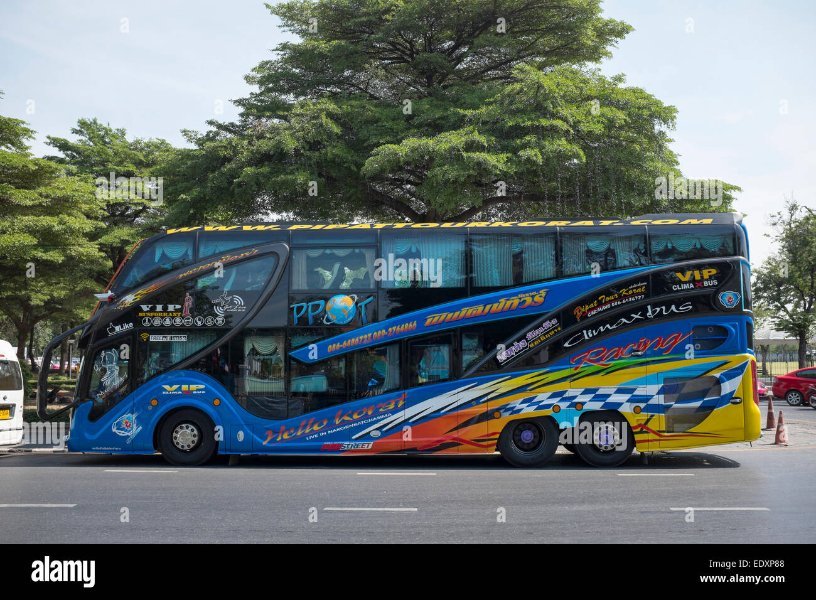
kwilco
Advanced Member-
Posts
5,545 -
Joined
-
Last visited
Content Type
Events
Forums
Downloads
Quizzes
Gallery
Blogs
Everything posted by kwilco
-
Are Trump's intentions positive, or is he just unhinged?
kwilco replied to spidermike007's topic in Political Soapbox
Americans showed be VERY concerned about Trump - he has rendered the county one of the world's most unpopular along with N.Korea and Russia and is riding rough-shod over the constitution.. -
quite apart from the smoke, they are "home built" - they look beautiful and the insides are glorious but they are not built for safety - they are sheet metal panels on timber frame on a old or second-handchassis that is often lengthened. They are meant to pass a ?tilt test" but enforcement is slack. Passengers are encouraged to mover around like they do on a plane. Most are converted to run on NGP system which is less efficient than straight diesel - hence the smoke. A few years ago I did a 3 day tour in one courtesy of a customs and excise dept.... it was fantastic, but the bus itself was unnerving.
-
Why so many conspiracy theorists and what to do about them
kwilco replied to kwilco's topic in Off the beaten track
It seems that people don't actually know how vaccines (and antibiotics) work - they use "natural" processes of the body - people love to make a fake difference between natural and some other category - they never explain the difference though. -
Why so many conspiracy theorists and what to do about them
kwilco replied to kwilco's topic in Off the beaten track
I blame Mulder and Scully… “The truth is out there.” But so are the stories we want to believe. Conspiracy theories aren’t new—they’ve always been around. Ancient Rome had rumours of secret cults. The Middle Ages blamed plagues on shadowy plots. Fire of London had Riots blaming foreigners. In the 20th century, it was aliens, secret societies, and the Bermuda Triangle swallowing ships whole. “Chariots of the Gods” sold the idea that ancient structures meant aliens were behind it all—not brilliant human engineering. Why? Because a mystery feels more thrilling than facts. And blaming the unknown feels better than admitting we just don’t know everything. These theories survive not because they’re proven—but because they feel good: They turn confusion into clarity, they make believers feel special, “in the know", they replace chaos with a story. But here’s the challenge: If conspiracy theories have always existed—even before modern science, the internet, or government intelligence—is it possible we’re repeating the same pattern? Creating myths to feel in control? Even Mulder had to face dead ends. And Scully kept asking the hard questions. So ask yourself: Are you actually chasing the truth? Or just an need for a version of a very old fantasy? -
Immigration Thai PM Tackles Overstaying Tourists with Visa-Free Scheme Revamp
kwilco replied to webfact's topic in Thailand News
can you be more specific? -
Immigration Thai PM Tackles Overstaying Tourists with Visa-Free Scheme Revamp
kwilco replied to webfact's topic in Thailand News
THat's actually non-news. Any country checks visitors for visa/entry and stay abuse..... what would be news is any changes but they haven't said anything about that. 60 day concerns re-entry concerns TDAC - hasn't been mentioned at all recently. and the ETA which has either been postponed or cancelled. ..but no news of any of this. -
Why so many conspiracy theorists and what to do about them
kwilco replied to kwilco's topic in Off the beaten track
QED! -
Why so many conspiracy theorists and what to do about them
kwilco replied to kwilco's topic in Off the beaten track
So where is you evidence? Your figures???? -
Why so many conspiracy theorists and what to do about them
kwilco replied to kwilco's topic in Off the beaten track
All except the dead people. -
Why so many conspiracy theorists and what to do about them
kwilco replied to kwilco's topic in Off the beaten track
But those are classic conspiracy theory tropes and language. Di you know th initial researsh program was set up incorporation with the USA? Do you think it was intentional? -
Collision reports are a vital part of road safety measures and are usually part of the public domain. – have you ever seen anything approaching this in Thailand? Proper collision investigation is vital for improving road safety, but in Thailand, the process is often chaotic and ineffective. In contrast to best practices seen in countries like the UK—where scenes are secured, evidence is carefully preserved, and trained specialists conduct in-depth analyses—Thailand’s investigations are frequently left to under-trained local police with minimal equipment or methodology. A standard investigative approach follows the METHANE protocol: • Make the scene safe • Establish the facts • Treat the injured • Hazards and risks • Access and egress • Notification and Evidence preservation Sadly, in Thailand, roads are rarely closed off, evidence is quickly lost, and investigations rely heavily on unreliable eyewitness accounts and superficial assessments. There’s minimal use of advanced technology like 3D scanning, drones, or data extraction from vehicles. As a result, accident reports are rushed, vague, and lack actionable insight. Road hazards remain unaddressed, and the opportunity to learn from each incident is missed. Worse, public discussion often devolves into uninformed, biased commentary rather than constructive analysis. Thailand has one of the highest road death rates globally—a fact unlikely to change without a shift toward professional, evidence-based collision investigation.
-
I find this comment quite outdated and overly simplistic. It completely ignores the broader context and real pressures that many drivers face, particularly those working long hours just to make a living. it makes assumptions about the causes of accidents—without referring to the actual crash report—that are speculative and uninformed. Also, sweeping generalisations about Thai drivers being under the influence is not only inaccurate, but, offensive. It unfairly paints an entire group with a negative brush based on assumptions rather than facts. If we want to talk about improving road safety, we should be addressing systemic issues—like working conditions, vehicle regulation enforcement, and infrastructure improvements—alongside driver behavior, not just laying blame in one direction. Let’s focus on facts, not stereotypes.
-
Every time there's a crash like this, the same old tired, ignorant comments appear—blaming the driver, mocking Thai people, and pretending to be experts on road safety. There’s no proper investigation, no real crash report—just assumptions and casual racism. Drivers here work brutal hours in unsafe vehicles on dangerous roads, with zero systemic support. This isn’t about one man’s mistake. It’s a failure of infrastructure, enforcement, and standards. If you can't offer empathy or informed insight, say nothing.
-
Swede's Split-Second Distraction Triggers Buriram Accident
kwilco replied to webfact's topic in Isaan News
Blame might feel satisfying, but it doesn't fix anything. Crashes happen because systems fail—roads, policies, vehicles—not just individuals. Focus on blame, and you miss the chance to prevent the next one. -
Swede's Split-Second Distraction Triggers Buriram Accident
kwilco replied to webfact's topic in Isaan News
So you are going to take the racist stance too? Most racist can't tell racism from a fact either - "That’s a fact, not a racial slur." -
Swede's Split-Second Distraction Triggers Buriram Accident
kwilco replied to webfact's topic in Isaan News
there you go! Why is it a that racists always argue that thinks they say aren't racist? -
You are obsessed with the concept of "blame' - with road safety, this was discredited over 50 years ago - you simply don't understand the first thing about road safety, which is why you keep posting nonsense. You need to realise that Modern road safety has moved beyond blaming individuals. Human error is inevitable, so the focus is now on designing systems that prevent serious outcomes. The Safe System approach prioritises safer roads, vehicles, and speeds— recognising that responsibility is shared. Blame doesn’t solve systemic issues or prevent future crashes. It distracts from real, structural improvements.










